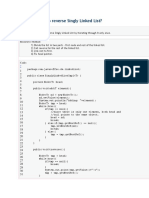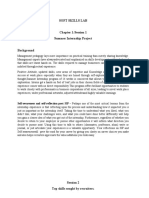# ArraySum.java
Uploaded by
hoangtu112201# ArraySum.java
Uploaded by
hoangtu112201# ArraySum.
java
Fork-Join Model: based on divide-and-conquer
fork: recursively break a task into smaller subtasks until they are simple enough
to run asynchronously.
join: solve each subtask and combine the results recursively
import java.util.concurrent.ForkJoinPool;
import java.util.concurrent.RecursiveTask;
public class ArraySum {
private static class SumTask extends RecursiveTask<Long> {
private final int[] array;
private final int start, end;
private static final int THRESHOLD = 1000;
public SumTask(int[] array, int start, int end) {
this.array = array;
this.start = start;
this.end = end;
}
@Override
protected Long compute() {
int length = end - start;
if (length <= THRESHOLD) {
// Compute directly
long sum = 0;
for (int i = start; i < end; i++) {
sum += array[i];
}
return sum;
} else {
// Split task
int mid = start + length / 2;
SumTask leftTask = new SumTask(array, start, mid);
SumTask rightTask = new SumTask(array, mid, end);
// Fork subtasks
leftTask.fork();
rightTask.fork();
long rightResult = rightTask.join();
long leftResult = leftTask.join();
return leftResult + rightResult;
}
}
}
public static void main(String[] args) {
// Sample array
int[] array = new int[10_000];
for (int i = 0; i < array.length; i++) {
array[i] = i + 1;
}
ForkJoinPool pool = new ForkJoinPool();
SumTask task = new SumTask(array, 0, array.length);
long result = pool.invoke(task);
System.out.println("Sum of array elements: " + result);
}
}
- a special thread pool designed to work well with fork-join model.
- executes subtasks in parallel using a pool (fixed number) of worker threads.
- It uses a work-stealing algorithm, where idle threads "steal" tasks from busy
threads to improve efficiency.
- Often more efficient than manually creating threads for recursive tasks.
Thread Pool
- a pool of threads that can be reused to execute tasks, so that each thread may
execute more than one task.
- comparison: "creating a new thread per task" vs. "thread pool reusing existing
threads for task execution"
+ Creating a new thread comes with a performance overhead compared to reusing a
thread that is already created.
+ That is why reusing an existing thread to execute a task can result in a higher
total throughput than creating a new thread per task.
+ Thread pool makes it easy to control how many threads are active at a time.
+ Built-in thread pool: ExecutorService
You might also like
- Thread Array Example: CS108, Stanford Handout #23 Fall, 2008-09 Osvaldo JiménezNo ratings yetThread Array Example: CS108, Stanford Handout #23 Fall, 2008-09 Osvaldo Jiménez2 pages
- Examen de Programacion Orellanas AstucuriNo ratings yetExamen de Programacion Orellanas Astucuri2 pages
- Name: Nazim Firdous Ali Bscs 6C Registration# 1612202 Assignment# 1No ratings yetName: Nazim Firdous Ali Bscs 6C Registration# 1612202 Assignment# 111 pages
- Q1: Write A Program in C Language For Addition of Two Polynomials Using PointersNo ratings yetQ1: Write A Program in C Language For Addition of Two Polynomials Using Pointers9 pages
- Program9573776838: How To Reverse Singly Linked List?No ratings yetProgram9573776838: How To Reverse Singly Linked List?57 pages
- Recursion: It's Turtles All The Way DownNo ratings yetRecursion: It's Turtles All The Way Down46 pages
- Tecnologico Nacional de México Instituto Tecnológico de LeónNo ratings yetTecnologico Nacional de México Instituto Tecnológico de León2 pages
- Apache Thrift: Thrift - Exe - R - Gen Java Hello - ThriftNo ratings yetApache Thrift: Thrift - Exe - R - Gen Java Hello - Thrift6 pages
- Sum The Values On A Diagonal of A 3x3x3 MatrixNo ratings yetSum The Values On A Diagonal of A 3x3x3 Matrix5 pages
- Sadrzi Samo 1 Polje Korisnik - Ime I 1 Korisnik - Id!No ratings yetSadrzi Samo 1 Polje Korisnik - Ime I 1 Korisnik - Id!7 pages
- Operating Systems: Part II: Introduction To The Unix Operating System (Utilities and ShellNo ratings yetOperating Systems: Part II: Introduction To The Unix Operating System (Utilities and Shell33 pages
- Bock D.L. - Jewish Expressions in Mark 14.61-62 and The Authenticity of The Jewish Examination of Jesus (JSHJ 2003)100% (1)Bock D.L. - Jewish Expressions in Mark 14.61-62 and The Authenticity of The Jewish Examination of Jesus (JSHJ 2003)14 pages
- Honorary Positions: G. N. Devy Professor, DAIICTNo ratings yetHonorary Positions: G. N. Devy Professor, DAIICT5 pages
- AWS Resource For Tech Support - PreQuiz - Attempt ReviewNo ratings yetAWS Resource For Tech Support - PreQuiz - Attempt Review4 pages
- Is The Church in View in Matthew 24-25-Bruce WareNo ratings yetIs The Church in View in Matthew 24-25-Bruce Ware11 pages
- What Would You Like To Show?: Three VariablesNo ratings yetWhat Would You Like To Show?: Three Variables10 pages

























































































